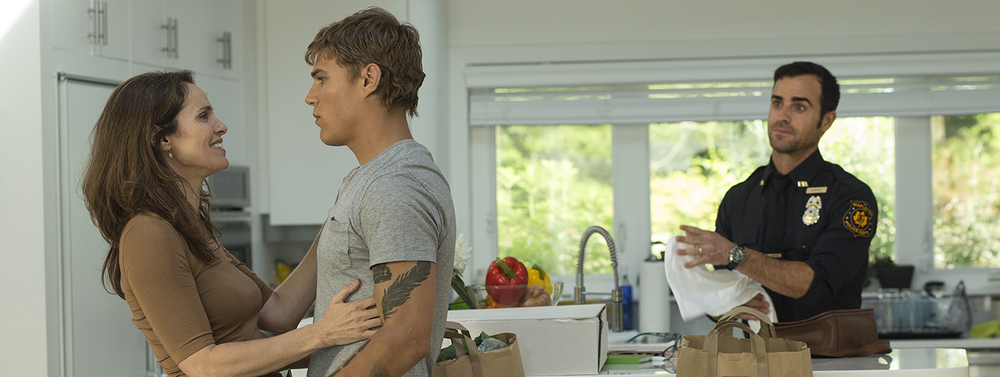
The Leftovers, everyone’s favorite new show to passionately either love or hate, aired its Season 1 finale this past Sunday. Like any show just starting out, it spent most of its first season explaining to viewers what it was on the surface while simultaneously stumbling to find its footing underneath. Damon Lindelof, once famous for co-creating Lost but now infamous for ruining its finale in the eyes of loyal viewers, has returned to TV as a co-creator of The Leftovers, and as much as you question his desire to tackle another show centered around a massive mystery that eventually needs a satisfying answer, you have to respect his bravery.
Full disclosure: I never watched Lost and I have no plans to. I know what it’s like to sink years of my life into a show and have the finale leave me feeling chea—FUCKING DEXTER FUCK FUCK FUCK—sorry, I have a really unfortunate tic. So I really have no interest in going through that dance again. Anyway, if I come off as a bit empathetic toward Lindelof, it should make a little sense. I’m not one of the countless former Lost fans that drove him off Twitter, after all.
From what I’ve heard about Lost, many of the show’s mysteries became attributed to the supernatural, and with The Leftovers, it’s unclear to what extent the show wants to commit to similar justifications. Granted, if 2% of the population suddenly disappeared with absolutely zero pattern or explanation, it’d be hard to concede that incident to purely “natural” forces—unless you’re quite religious. Still, such an abnormal premise unfolding in a seemingly normal world opens up a huge gray area when it comes to answering a simple question: how? Which is really just another way to ask why.
For a show with this kind of gray area, religion should play a central role, and The Leftovers rightly recognizes that. In general, people fear the unknown, and many have historically used religion as a way to explain what they don’t understand. That’s of course a completely stripped down analysis, and there’s obviously a wide spectrum when it comes to religious inclinations, but it’s hard to argue that a core component all of them share is faith.
So what happens when faith is stretched to a breaking point, or more accurately, a shattering point like in The Leftovers? Do people cling tighter to it? Renounce it completely? Veer in a seemingly insane direction and embrace a sort of anti-faith à la the Guilty Remnant? According to this show, all of the above.
Even more intriguing is how to present this scenario on TV, given ten hour-long episodes to set the stage for…what? Continued pain and suffering? A search for answers that may never come? The Leftovers Season 1 had to strike a very delicate tone with its delivery, and actually may have overplayed its hand when it came to the tremendous sense of loss. It seems almost insensitive to say, but the show feels rather heavy-handed with the obvious emotions of grief, confusion, and frustration.
Episode 9, “The Garveys at Their Best,” ironically a flashback episode detailing the main characters’ happy lives in the 24 hours leading up to “the departure,” is actually the biggest culprit of this heavy-handedness. Outside of Kevin Garvey, the show’s protagonist (and Nora Durst, who lost her whole family), everyone is literally a montage of slow-motion laughing and smiling. This in itself is cartoonish, and places such a stark contrast to their dark and brooding future selves that those versions also become over the top.
At the same time, it does seem trivial to judge the density of sadness in a show that quite frankly has no business being light. The Leftovers just isn’t going to be a sitcom, and let’s all be thankful no one’s trying to make it one. In a show that presents a horrific worldwide phenomenon however, it’s only fair to nitpick at the only small town we’re given a glimpse of, even if that’s by design due to storytelling limitations. In a way, it faces some of the same problems as The Walking Dead, which tells viewers the world they’re watching has suffered a global catastrophe, but limits the action to a cluster of people circling the drain somewhere in the suburbs of Atlanta.
Outside of noting that Shaq and Adam Sandler were among the departed in the pilot, The Leftovers hasn’t ventured too far out of its controlled environment. Here’s to hoping that Season 2 and beyond open the veil a little further—not necessarily to detail exactly how excited the world is about Putin’s disappearance, but…then again, why not? What of the truly despised people that are no more, and the morbid reaction of gratification some people feel? That’s twisted.
The point being this: there’s a lot more to play with here, and Season 1 has only scratched the surface. Lindelof has already promised that he won’t disappoint with The Leftovers finale, and as awkward as it is that him and many viewers are already intently focused on the end of a show that might stay on the air for years, it’s what we all signed up for.
Ideally, next season and beyond, Lindelof and the writing staff will take that cryptic moving painting in the opening sequence and its foreboding yet whimsical music as far as they’ll go. Since we’re already waiting for the endpoint, let’s have some fun along the way.
And by fun I mean really, really dark discussions about human purpose and existence. You know, all that family-friendly stuff.

